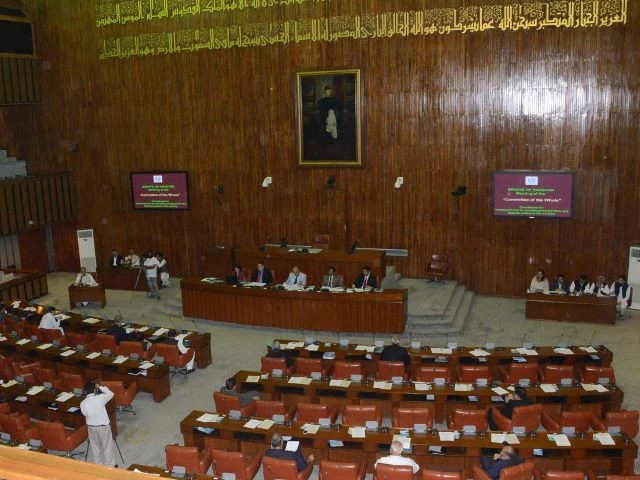Senate takes up Sindh’s water schemes
Quorum was low in session, expected to take up 27th admendment

All eyes were on the Senate session today, as the much-anticipated 27th Constitutional Amendment was expected to be tabled and spark major debate. However, to much disappointment, the draft failed to appear on the floor of the House. Many senior members and key senators were absent, and instead discussed the amendment in their respective party meetings outside the Senate session.
The ruling Pakistan Muslim League-Nawaz (PML-N) had already finalised the initial draft of the amendment, with Prime Minister Shehbaz Sharif having consulted coalition partners ahead of its presentation.
Federal Minister Rana Tanveer Hussain highlighted that parties are still consulting on a few points regarding the draft. He clarified that the amendment would not be tabled today and that another federal cabinet meeting would be convened for further discussion.
Read: PM courts allies over 27th amendment
Separately, JUI-F chief Maulana Fazlur Rehman convened a meeting of his parliamentary group at his residence to discuss the prevailing political situation and the proposed 27th Constitutional Amendment. The meeting was attended by the party’s senators and MNAs, with consultations on recent interactions with the government and opposition representatives.
With the amendment delayed, discussion in the Senate turned to Sindh’s water projects and the performance of NESPAK. The session grew tense as PTI Senator Saifullah Abro and Senator Nasir Mahmood Butt engaged in a heated exchange, prompting the presiding officer, Senator Manzoor Ahmed, to intervene.
Senator Abro raised serious concerns over NESPAK’s management and the government’s handling of the Soan River Dam project, alleging that the former managing director was “forcibly removed” and claiming there were attempts to “destroy the institution.” He suggested that the matter be referred to the relevant committee for a detailed review.
Abro’s remarks came amid a mega project launched earlier to improve the Soan River’s water quality, aiming to provide 24-hour drinking water to over 250,000 residents of Rawat and Chauntra. The feasibility study explored installing tube wells with treatment plants or treating river water at centralised facilities, supported by a five-million-gallon water tank and new pipelines.
Senator Azam Swati stressed the need to expand water reservoirs to prevent flooding, noting that the feasibility study for the Soan River Dam would be completed in 2026 and cover a ten-year period. Members also raised questions regarding the dam’s construction timeline.
The exchange escalated further when Abro raised additional questions on Sindh’s river water schemes. Responding, Federal Law Minister Azam Nazeer Tarar said, “No one can memorize all facts and figures. We must base our discussions on verified information.” He emphasized that accountability is the system’s “biggest strength” and urged lawmakers to avoid repetitive arguments.
Deputy Prime Minister and Senator Ishaq Dar also arrived in the chamber during the proceedings.
Energy crisis and IPPs under scrutiny
Senator Abdul Qadir raised concerns over Pakistan’s economic and energy crisis, highlighting that 70% of the population lives below the poverty line. He criticised Independent Power Producers (IPPs), saying they exploit the public and hold successive governments “hostage,” collecting Rs2,200 billion under capacity charges.
He urged the Prime Minister to intervene, noting that many low-income households are turning to solar energy, which IPPs are discouraging.
Describing electricity bills as a form of “terrorism” against the poor, he said, “If someone is installing solar under a self-help initiative, why is their effort being discouraged? Ten to fifteen crore people are victims of IPPs’ exploitation. Why isn’t a forensic audit being conducted on these companies?”
Other key discussions and developments
Senator Khalil Tahir Sindhu marked a historic milestone, congratulating Zohraan Mamdani, who became the first Muslim elected mayor in New York with one million votes. He expressed hope that in cities like Lahore, Karachi, or Faisalabad, a Christian candidate might also be elected as mayor.
Separately, the Senate approved a 100-day extension for the Frontier Corps (FC) reorganization ordinance, giving the government more time to implement structural and administrative reforms. The FC is a paramilitary force in Pakistan tasked with maintaining law and order, particularly in border and tribal areas, and assisting the army in counterterrorism and internal security operations.
Read More: Punjab Child Protection Bureau reunites Afghan children with families
Moreover, Barrister Aqeel Malik, responding to a question from Senator Shahadat Awan, said the government’s foremost priority is the protection of children and future generations. He noted that the Child Protection Institute, established in 2021, maintains a detailed breakdown of data and that the government is fulfilling all transparency requirements. He welcomed suggestions from committee members and agreed that more effective measures were needed for child welfare.
Senator Azam Swati also highlighted the importance of the opposition leader in the functioning of the House, urging the Law Minister to clarify the course of action. He recalled how opposition leaders, including Shehbaz Sharif as the National Assembly opposition leader, were jailed during previous terms despite their official roles.
PTI members created a commotion when Senator Emal Wali Khan was allowed to speak. During his speech, he remarked, “Do they have an issue with me or with you? This is not a floor, it’s a pile of filth, and you have handed this pile of filth to me.”
In the midst of all this, the Senate session has been adjourned until 11 am tomorrow.






1724319076-0/Untitled-design-(5)1724319076-0-208x130.webp)













COMMENTS
Comments are moderated and generally will be posted if they are on-topic and not abusive.
For more information, please see our Comments FAQ